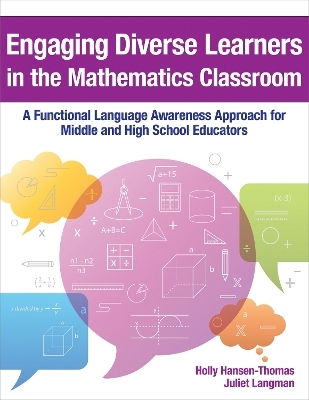
Engaging Diverse Learners in the Mathematics Classroom
Brookes Publishing Co (Verlag)
978-1-68125-631-3 (ISBN)
Language is a vital tool for teaching math—it’s present in word problems, textbooks, teacher talk, and more. With this game-changing guidebook, middle and high school teachers will harness the power of language to ensure math success for all students, including multilingual and other diverse learners who may need support to access academic language.Introducing a unique functional language awareness approach developed through decades of research and field work, this book helps teachers examine how they use language in the math classroom and make small changes to their words and practices to support student learning. Math teachers will see the functional language awareness approach in action across different classroom contexts, and they’ll get a practical collection of ideas, activities, and tools for making the most of language in the math classroom. An innovative approach that complements popular math models used with English learners, this guidebook will help educators use language consistently and effectively to meet the learning needs of all
MATH TEACHERS WILL:
record, analyze, and reflect on their own use of language in the classroom
increase understanding of student strengths and needs by developing learner profiles
establish language-rich interactive routines that engage all learners
plan powerful math lessons with an explicit focus on how language can support learning
build student competence in key skills related to math, including explaining, reasoning, and problem-solving
teach students precise language for communicating their math knowledge
use a think-aloud technique to reflect on and improve elements of their planning and teaching
SPECIAL FEATURES: Leverage language effectively in the math classroom through sample transcripts of teacher-student discourse, Try It Yourself boxes, On Your Own activities, and reflective practice. Online materials include a lesson plan template, sample lesson plan, transcription guide, and other forms to support effective teaching.
About the Online Companion Materials
About the Author
Foreword
Preface
Acknowledgements
Chapter 1: A Functional Language Awareness Approach to Teaching Mathematics
Objectives
What we mean by language and literacy
Solving for area: A language function with many features
Introducing functional language and language awareness
Summary
Chapter 2: Into the Classroom: Contexts and Activities
Objectives
Defining contexts for learning
Embracing diverse classroom experiences
Learning through activity
Summary
Chapter 3: Lesson Planning with Language Functions and Language Objectives in
Mind
Objectives
Lesson planning with functional language awareness
Understanding language demands and language objectives
Summary
Chapter 4: Introducing New Material: Defining and Describing
Objectives
What do we mean by ‘defining’ in the mathematics classroom?
Focusing explicitly on vocabulary
Tools for word study in the classroom
Summary
Chapter 5: Making Sense of Problems: Inferring, Predicting and Outlining
Objectives
What we mean by problem-solving in the mathematics classroom
Focusing explicitly on grammar
Tools for problem solving in the classroom
Summary
Chapter 6: Building Expertise in Explaining and Reasoning
Objectives
What we mean by explaining in the mathematics classroom
Focusing explicitly on grammar and frames for explaining
Promoting explaining in the classroom
Summary
Chapter 7: Reviewing and Communicating Results
Objectives
What we mean by reviewing and communicating results
The art of reviewing in the mathematics classroom
Communicating results: Precision in language
Summary
Chapter 8: Reflecting on Practice in Functional Language Awareness Classrooms
Objectives
Using functional language awareness to design and reflect on the big issues
Reflection in unit and lesson planning
Summary
Glossary
References
| Erscheinungsdatum | 25.10.2022 |
|---|---|
| Verlagsort | Baltimore |
| Sprache | englisch |
| Maße | 213 x 276 mm |
| Gewicht | 259 g |
| Themenwelt | Sozialwissenschaften ► Pädagogik ► Didaktik |
| Sozialwissenschaften ► Pädagogik ► Schulpädagogik / Grundschule | |
| ISBN-10 | 1-68125-631-2 / 1681256312 |
| ISBN-13 | 978-1-68125-631-3 / 9781681256313 |
| Zustand | Neuware |
| Haben Sie eine Frage zum Produkt? |
aus dem Bereich


